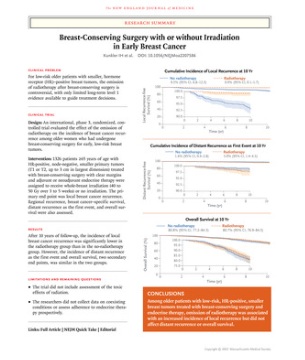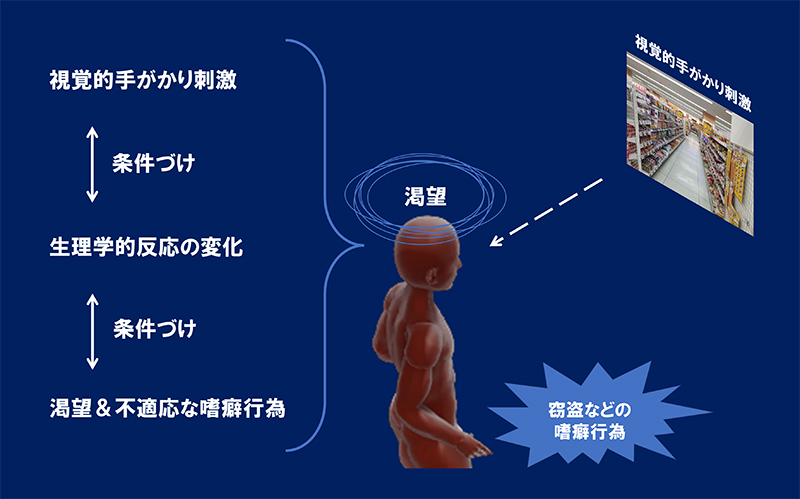2023-02-16 エディンバラ大学
◆放射線療法はまた、転移として知られる二次的な腫瘍のリスクにも影響を与えないことが明らかになった。しかし、がんが再発する可能性はわずかに低下したが、臨床的に許容されるリスクの範囲内であった。
◆この10年間の研究は、高齢の乳がん患者を対象とした最初の長期臨床試験の一つであり、65歳以上の早期乳がんの治療において、放射線療法を安全に除外できることを示唆していると、専門家は述べています。
◆65歳以上の患者さんは、少なくとも患者さんの50%を占めています。放射線治療は高齢の患者さんには負担が大きく、副作用として心臓障害や二次がんを引き起こす可能性がありますが、この年齢層を対象とした臨床試験はほとんど行われていません。
◆エディンバラ大学とエディンバラ西部総合病院の研究者は、1,326人の患者を対象にPRIME IIと呼ばれる無作為臨床試験を行い、乳房切除術とホルモン療法に放射線療法を併用することが必要であるかどうかを検討した。
◆対象は65歳以上のいわゆる「低リスク」乳がん患者で、腫瘍の大きさが3cm以下で、脇の下のリンパ節に転移がなく、ホルモン療法に反応する可能性のある患者を対象とした。
◆参加者は全員、乳房温存手術と少なくとも5年間のホルモン療法を処方された。グループの半数は、術後3〜5週間の放射線療法を追加するよう無作為に選択された。患者は年1回の診察と乳房スキャンで評価された。
◆研究チームは、放射線療法を受けずに治療した患者の10年後の治療した乳房のがん再発リスクは9.5%であったのに対し、放射線療法を行うとリスクは0.9%に減少することを見いだした。この差にもかかわらず、どちらも現在の臨床ガイドラインで認められている再発の範囲内です。全生存率には両群間に差はなく、死亡のほとんどは乳がん以外の原因によるものでした。
<関連情報>
- https://www.ed.ac.uk/news/2023/radiotherapy-optional-for-older-breast-cancer-pati
- https://www.nejm.org/doi/10.1056/NEJMoa2207586#article_related_articles
早期乳癌における乳房温存手術と放射線照射の併用について Breast-Conserving Surgery with or without Irradiation in Early Breast Cancer
Ian H. Kunkler,Linda J. Williams,Wilma J.L. Jack, M.B., David A. Cameron and J. Michael Dixon
New England Journal of Medicine Published:February 16, 2023
DOI: 10.1056/NEJMoa2207586

Abstract
BACKGROUND
Limited level 1 evidence is available on the omission of radiotherapy after breast-conserving surgery in older women with hormone receptor–positive early breast cancer receiving adjuvant endocrine therapy.
METHODS
We performed a phase 3 randomized trial of the omission of irradiation; the trial population included women 65 years of age or older who had hormone receptor–positive, node-negative, T1 or T2 primary breast cancer (with tumors ≤3 cm in the largest dimension) treated with breast-conserving surgery with clear excision margins and adjuvant endocrine therapy. Patients were randomly assigned to receive whole-breast irradiation (40 to 50 Gy) or no irradiation. The primary end point was local breast cancer recurrence. Regional recurrence, breast cancer–specific survival, distant recurrence as the first event, and overall survival were also assessed.
RESULTS
A total of 1326 women were enrolled; 658 were randomly assigned to receive whole-breast irradiation and 668 to receive no irradiation. The median follow-up was 9.1 years. The cumulative incidence of local breast cancer recurrence within 10 years was 9.5% (95% confidence interval [CI], 6.8 to 12.3) in the no-radiotherapy group and 0.9% (95% CI, 0.1 to 1.7) in the radiotherapy group (hazard ratio, 10.4; 95% CI, 4.1 to 26.1; P<0.001). Although local recurrence was more common in the group that did not receive radiotherapy, the 10-year incidence of distant recurrence as the first event was not higher in the no-radiotherapy group than in the radiotherapy group, at 1.6% (95% CI, 0.4 to 2.8) and 3.0% (95% CI, 1.4 to 4.5), respectively. Overall survival at 10 years was almost identical in the two groups, at 80.8% (95% CI, 77.2 to 84.3) with no radiotherapy and 80.7% (95% CI, 76.9 to 84.3) with radiotherapy. The incidence of regional recurrence and breast cancer–specific survival also did not differ substantially between the two groups.
CONCLUSIONS
Omission of radiotherapy was associated with an increased incidence of local recurrence but had no detrimental effect on distant recurrence as the first event or overall survival among women 65 years of age or older with low-risk, hormone receptor–positive early breast cancer. (Funded by the Chief Scientist Office of the Scottish Government and the Breast Cancer Institute, Western General Hospital, Edinburgh; ISRCTN number, ISRCTN95889329. opens in new tab.)


